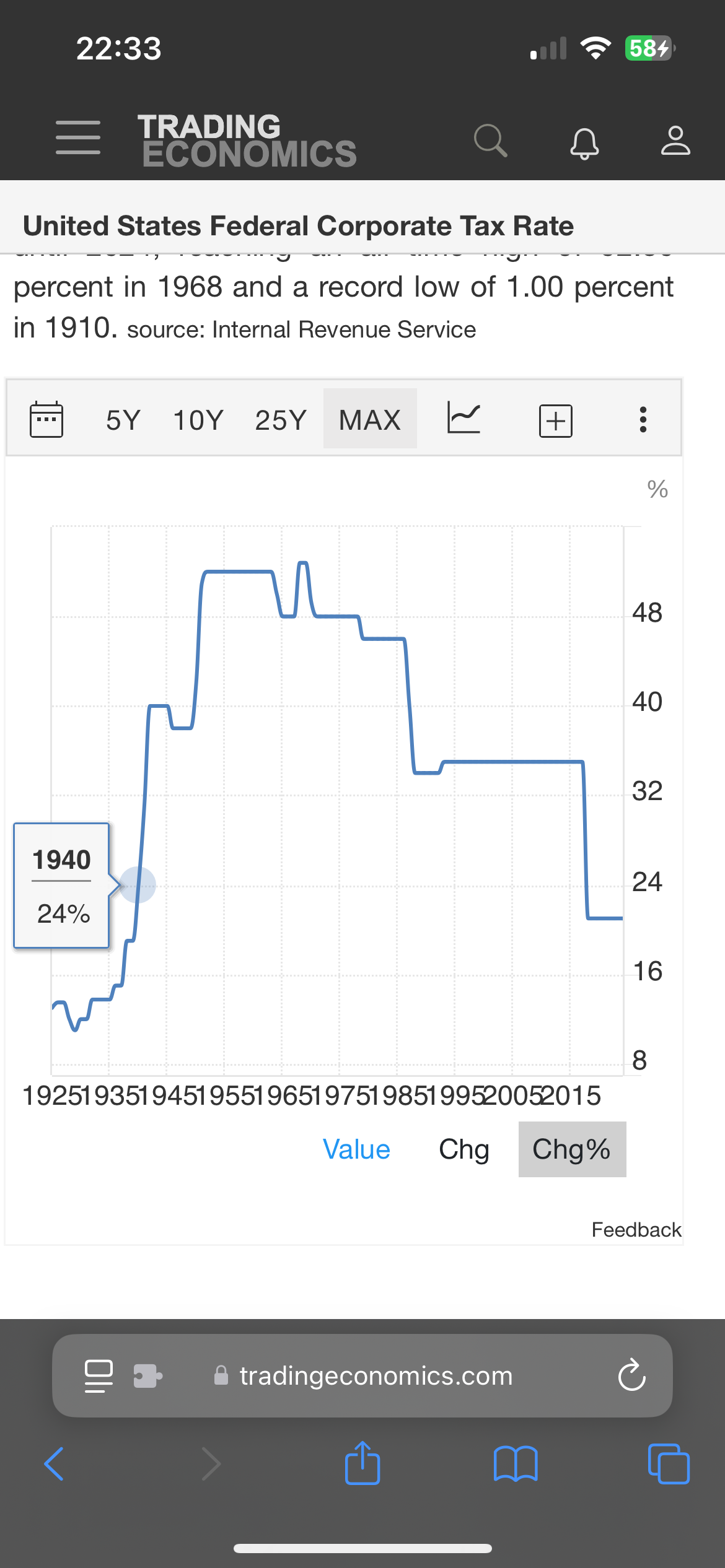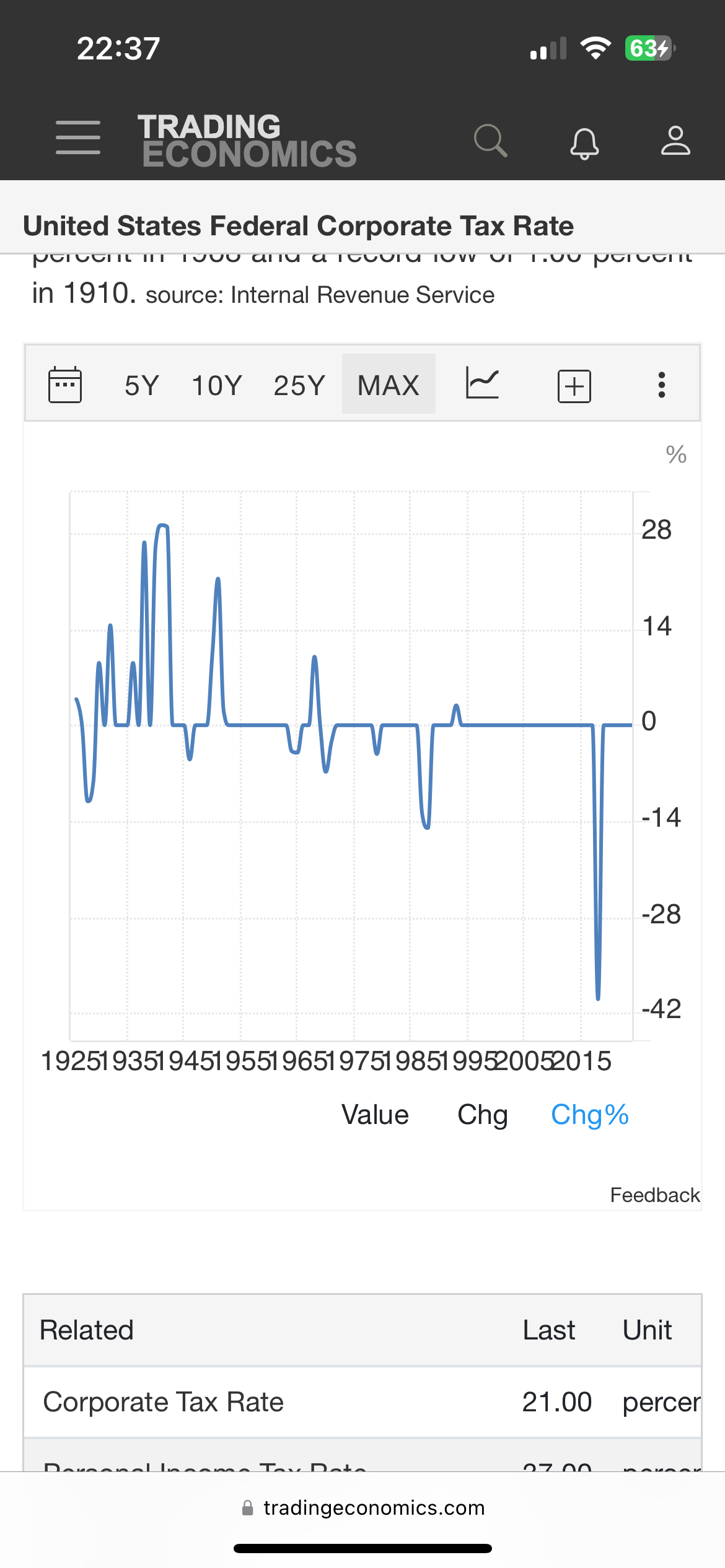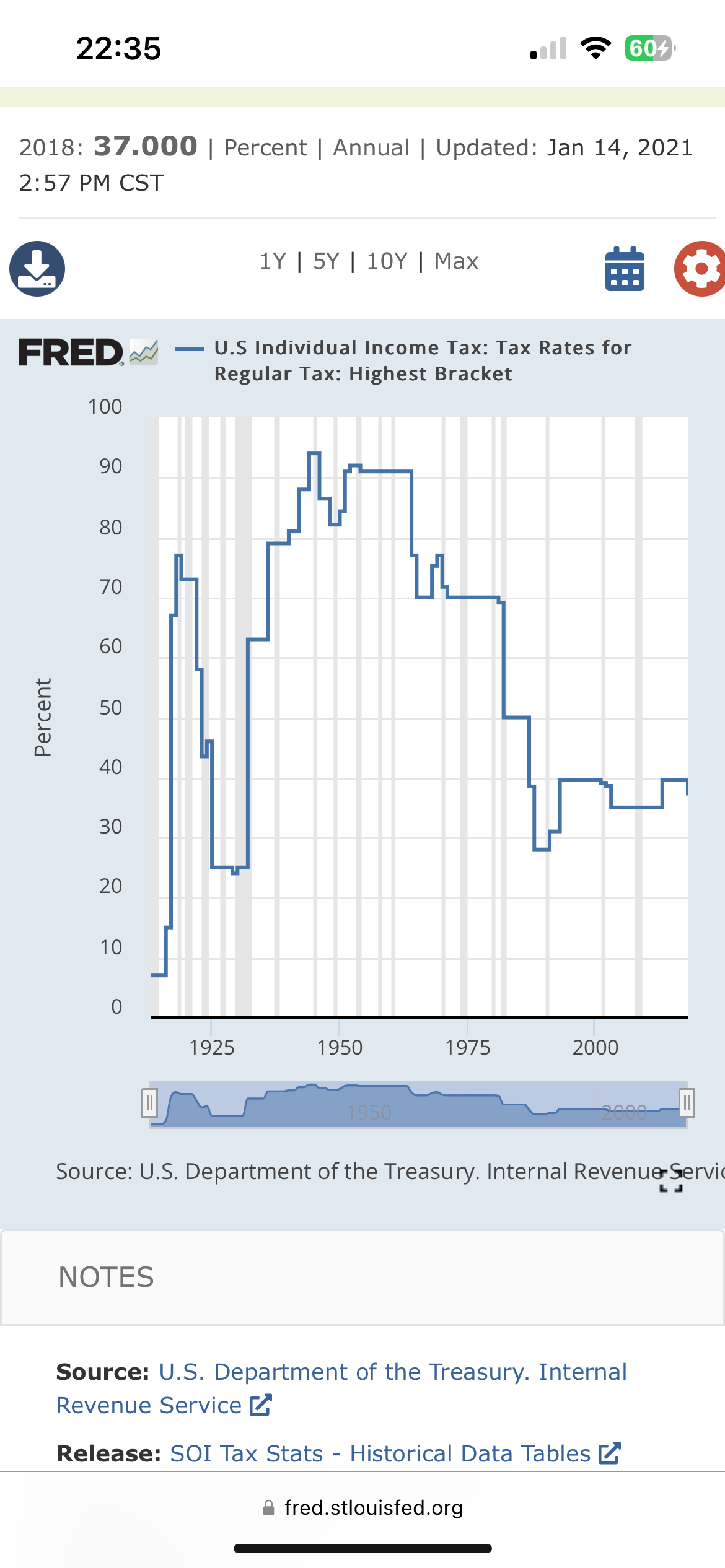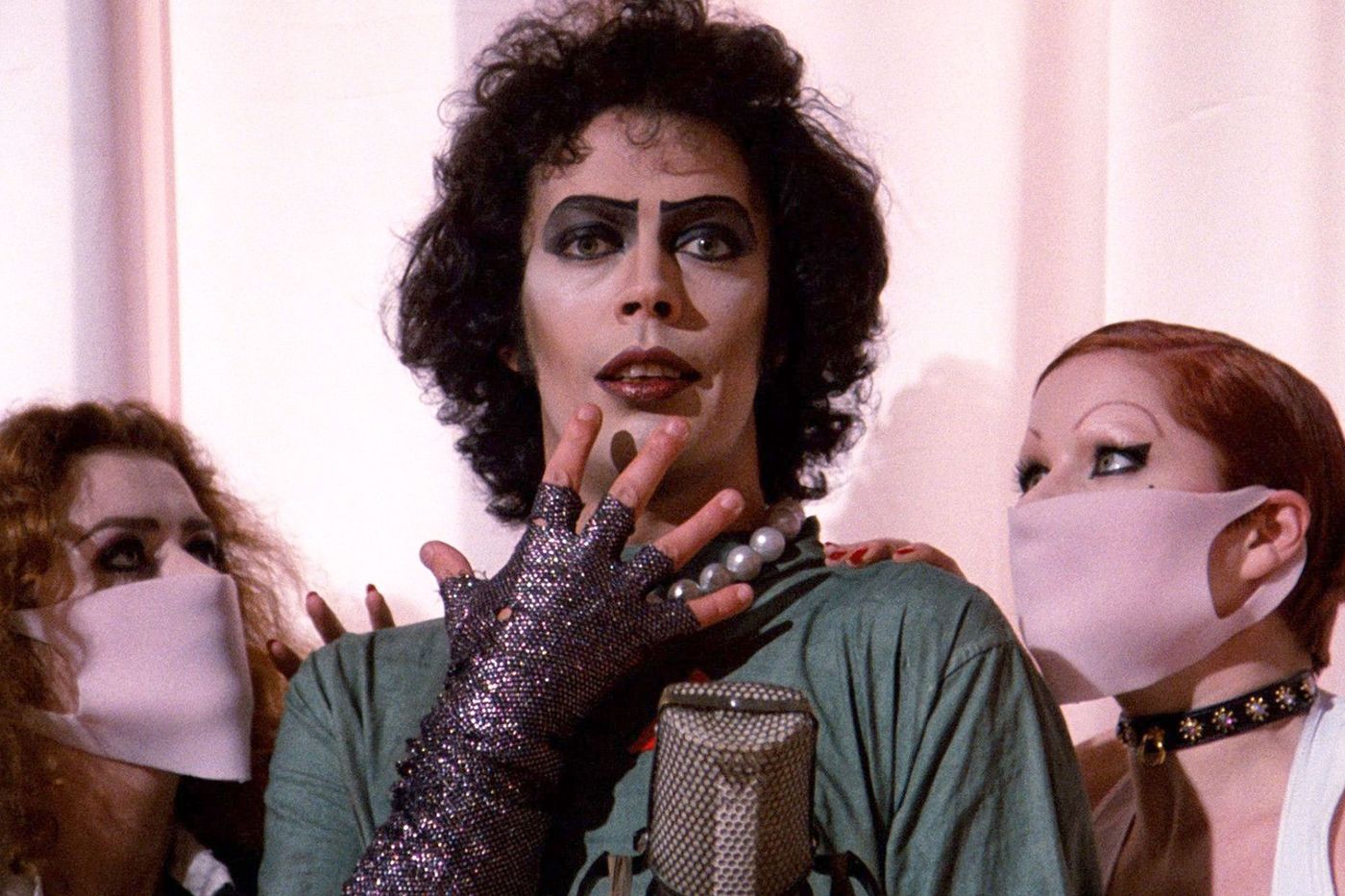Fucking insane that 28% is a tax hike.
I’m afraid to ask, but what is the current number?
Currently a flat 21%
Should be no less than 90%, like it used to be.
The top marginal corporate tax rate never exceeded 52.9%. This is conflating the corporate tax rate with the individual income tax rate. The marginal rate was raised above 80% during the Great Depression, and it was raised above 90% in the 1940’s.
In the 1950’s, the top marginal tax rate was 90%, but people were allowed to avoid income tax by funneling income through corporate tax shelters, leaving a top effective tax rate that wasn’t much higher than it is today (the exact number is hard to calculate). Not only that, but the tax burden has also shifted dramatically since the 1950’s. In Eisenhower’s day, those earning more than $100,000 per year shouldered around 20% of the tax burden. Today, the equivalent economic class shoulders over 80% of the tax burden.
Heres another flaw: when tax rates were 90%, the tax code also provided for tons of deductions that no longer exist. It also treated income from many sources as not being subject to tax, such as income derived from trusts or investments held in trusts. Imagine Bill Gates placing his Microsoft stock into a trust and only paying tax on the money he takes as a salary from his Foundation or from speaking fees. Sure, his “tax rate” might hit 90%, but the vast majority of his income would escape taxation. Such was the tax code under Eisenhower. You can’t just compare tax rates without also accounting for the rest of the tax laws including credits, deductions, exclusions, and definitions of taxable income.
So, no, corporate tax rates were literally never 90%.
Are you including the fact that $100,000 in the 1950s is more than $1million after accounting for inflation?
According to some quick googling, $1,300,000 is the modern equivalent of $100,000 in 1950. That would put you in the top 5% earners (and very nearly in the top 1%). According to the IRS, the top 5% contribute about 65% of the tax burden.
The top 25% make up about 90% of contributions, but that starts around $70,000 annual income.
that is fascinating… do you have some longer easy to read source to learn about this topic?
also, you say those earning 100k in 1950’s only carried 20% of tax burden and now they carry 80%… what exactly is tax burden and is that number inflation adjusted? how big fraction of income distribution are we talking about?
You have to bear in mind that the “like it used to be” part operated when digital card payments were not a thing. A customer would give you cash, and maybe you would write it down in your taxes, but there was no digital indicator of what actually happened.
Small business owners got to stay afloat by swindling the government, and this was the normal way for centuries.
I’m not saying it’s right, just that the high business tax of the past wasn’t as effective as you think it was, and will hit extremely differently this time around in the digital era.
The best thing to have is a variable tax rate that goes up the more profit is made.
That’s how it is in my country.
what if a company decides to split up into 100 smaller companies to avoid taxation?
Identify them then seize all of their assets IMO.
That’s fraud and illegal.
I’m pretty sure that it would be practically impossible to prove in practice that it’s fraud and illegal.
Good?
Smaller businesses have better wages and hire more people. Smaller businesses are more nimble, flexible, and they’re never too big to fail. Smaller businesses, mean more options, more ideas, and variety is good for the marketplace, consumer, and the country as a whole.
Less consolidation is good! Competition is good!
Smaller businesses are more nimble, flexible, and they’re never too big to fail.
Some of this is questionable and other bits are flat wrong. Small businesses have bigger lending costs and less slack in their workforces, so they’re often contained to focusing on a niche field.
And after a break up or spin off or outsourcing effort, certain components of the old business can become lynchpins for the rest.
That’s basically the story of Cloud Strike. Much smaller than it’s clients, but still too critical to be allowed to fail.
And just because a business administration is broken up doesn’t mean it’s revenues are. Modern conglomerates - Berkshire Hathaway, and Citadel Investments being the most notorious - have big stakes in enormous swaths of private industry. They control enough board seats to function as economic central planners.
Buffet doesn’t really care if he owns one big Coca-Cola or a thousand little ones, just so long as he continues to extract that sweet sweet labor value.
That used to be the case until 2017. Highest bracket was 39%, but they had a weird system where it went UP until about 350Kish, (Income between 100K~350K) and then the variable rate started dropping again for income past that, back down to 35%. Would have been fair to assume any fortune 500 company not doing shady shit would have paid an effective rate of 35%.
Trump’s tax cuts drastically decreased that, down to 21% flat for everyone. 28% would still be a tax cut over what it was up til 2017.
Awwww… Raise it above the old 35% tax rate at least.
It’s still a start, and something more likely to get though congress
And index it against inflation. 😉
No better: to the cost of living index. That way if they pump prices up like they have in the last few years, they choke themselves with their own rope.
49% is golden. But 28% is a start.
Staggered based upon gross income just like personal taxes.
Tiny businesses 5% Small businesses 25% Mid sized companies 50%. Mega-corporations wth billions - 95%
Sure. Gimme a progressive tax rate across the board.
One problem with that is that companies could create a ton of subsidiaries or shell companies and move money around in funny ways to keep all of them at the lowest bracket
Does it really matter what the rate is when they don’t pay it anyway?
"The analysis names 35 corporations, including Tesla, Netflix and Ford, that each reportedly spent more on compensation to their five highest-paid executives than they paid in federal income taxes over five years.
Collectively, the 35 corporations spent $9.5 billion on their top executives over that span, the report said, while their combined federal tax bill came to -$1.8 billion: a collective refund."
What’s your conclusion? That we shouldn’t tax anyone at all?
Why isn’t your conclusion that we should find these husks of supposed humans and turn them inside out? Why isn’t your conclusion that chunks of SpaceX, chunks of Amazon, chunks of Google, should be rightfully owned by the American public?
Close the loopholes that let companies with billions in revenue pay 0 in taxes.
Because socialism generally speaking works really really badly? Taxation should ideally be zero, but since there are obvious things 99% of us agree that should be funded in a centralized way, we have to have taxes.
The point of taxes is not to make everyone equal, the point is to fund those important things. For instance: police, military, education, basic healthcare (perhaps), charity for the less fortunate and certain natural monopolies like utilities.
Yes, there’s more to be done, obviously.
For someone who clearly knows how fucked the issue is that wording seems almost distracting from the road that will get us to a solution. It’s a good thing, let it happen.
Imagine if the law was no more can be spent in corporate executive compensation than the company pays in taxes. Idk if that’s a good idea for small cooperations, but it’s a jumping off point.
We could set it so that companies whose CEO’s net worth is less than a half mil are exempt
Here’s a wild idea… tax corporations based on income, not profit.
As much as I like the idea it aint exactly a clean cut rule, a lot of companies operate on slim marjins due to loans or just that being how it is so taxing income could fuck over way more than just the greedy assholes. I do think taxing based off of stock prices should be a thing, the stocks reflect the physical value right? That means they should be able to pay the taxes.
I mean, when I pay my taxes, it’s based on how much money I earned, not how much money I have left over at the end of the year.
If the argument is “Corporations are people, my friend” they should be paying an income tax, same as anyone else.
Holy shit if a corporation is a person…
…does this mean a person is a corporation?
Man it’s so fucking straightforward for the IRS to see that Mom’s fettuccine restaurant is a little bit different from fucking Amazon, Meta, Ford etc from just putting all of it’s money into itself and calling it a loss.
Oh certainly but heres the thing we live in a legalistic society and the sons of bitches would figure out some way of fucking up that type of tax.
Well you brought up like the most manipulatable resource as a means of taxation, so I see why you feel they’d always win. I mean Trump’s entire career has been made simply lying about the value of his assets when it suited him. That’s not a “loophole”, inasmuch as it’s fraud that isn’t caught.
You want it to end? Give the IRS more money. Allow the FEC to attack monopolies and monopsonies. The rich simply lie and print advertisements convincing rubes to destroy the system. Regulate the news, advertising. “Ohh but mah freeze peach”, well then you get unregulated, untaxable, unrestrained capitalistic greed.
It makes sense. More income, more bonus. It would also prevent companies from handing out bonuses while operating at a loss.
I gotta tell ya, “is planning on increasing corporate taxes” seems like the right direction to me. So, yes.
Exactly. If the don’t close the loopholes then this means precisely dick.
I’m game for over 50% really
NBC News - News Source Context (Click to view Full Report)
Information for NBC News:
MBFC: Left-Center - Credibility: High - Factual Reporting: High - United States of America
Wikipedia about this sourceSearch topics on Ground.News
you suck
Republicans love to harken back to “the golden age” of america. Ever wonder what paid for it? A big portion was … corporate tax!
https://taxfoundation.org/data/all/federal/historical-corporate-tax-rates-brackets/
Corporate tax is currently at the lowest point since 1940
https://tradingeconomics.com/united-states/corporate-tax-rate

See this big drop in corporate tax? You thank ol’ trumpy for that

Along with personal income tax - Note this is the top bracket of tax

https://fred.stlouisfed.org/series/IITTRHB
Want your golden age back? Tax these fucking billionaire grifters.
…? Your numbers literally state that PERSONAL marginal income taxes were 90%. Corporate taxes were, yes, 100% higher. So were personal tax rates.
I stated both. I listed both corporate and personal tax. What are you referring to?
edit - do you mean the personal bracket?

Are you argiuing that corpate tax rates should double to its peak rates? Would that also mean personal rates should double back to its peak? Graphs paint a very incomplete and poor picture that are easily misunderstood.
In the 1950’s, the top marginal tax rate was 90%, but people were allowed to avoid income tax by funneling income through corporate tax shelters, leaving a top effective tax rate that wasn’t much higher than it is today. Not only that, but the tax burden has also shifted dramatically since the 1950’s. In Eisenhower’s day, those earning more than $100,000 per year shouldered around 20% of the tax burden. Today, the equivalent economic class shoulders over 80% of the tax burden. Lowering the tax rates and eliminating loopholes in the 1960’s and 1980’s actually resulted in the rich paying a much higher share of total taxes.
The high rate created incentives for corporations to find ways to minimize their tax burden, such as increasing debt financing, retaining earnings, and pursuing tax loopholes. This led to distortions in corporate decision-making and the allocation of capital. Additionally, the high rate may have discouraged some new business formation and investment.
Whether a 90% corporate tax rate, BTW, which never existed, would work effectively today is debatable. The economy and global business environment have changed considerably since Eisenhower’s era. A rate that high could potentially lead to more severe distortions, capital flight, and reduced competitiveness for U.S. companies in the modern globalized economy. Most tax policy experts believe a more moderate corporate rate, combined with a broader tax base and fewer loopholes, would be more effective at raising revenue while minimizing economic distortions.
The data shows that, between 1950 and 1959, the top 1 percent of taxpayers paid an average of 42.0 percent of their income in federal, state, and local taxes. Since then, the average effective tax rate of the top 1 percent has declined slightly overall. In 2014, the top 1 percent of taxpayers paid an average tax rate of 36.4 percent.
All things considered, this is not a very large change. To put it another way, the average effective tax rate on the 1 percent highest-income households is about 5.6 percentage points lower today than it was in the 1950s. That’s a noticeable change, but not a radical shift.
Reminded of wtfhappenedin1971.com
The numbers, what do they mean?
Another thing that raising the corporate tax rate does is make it more profitable to re-invest your income into the company. Since they’re only taxed on profits they’ll pay zero taxes if they make zero profit. How do you do that? Expanding your business, spending money on R&D, and paying your employees more.
Ideally, yes - but until share buybacks are outlawed - companies will just ‘reinvest’ by buying up shares (increasing their price, and thereby existing shareholder wealth), and issuing them as bonuses to their C-suite in lieu of payment… by-and-large avoiding a lot of the income tax that they would otherwise be due to be paid.
Our current late-stage capitalist corporate system is built upon layers and layers of tax-avoidance and self-enrichment at the cost of society as a whole.
One of the driving economic forces associated with taxation is human nature. You simply cannot legislate around it. Enter the Laffer Curve. Google it. Basically, if the government taxes at zero percent, it gets no revenue. That’s obvious. If the tax rate is 100%, you get the same result. People either won’t work or (more likely) they’ll work for cash under the table. Tax evasion becomes a full-time indoor sport. As government increases tax rates from 0% to 10%, it gets money! It gets even more if it goes from 10% to 20%. But soon that revenue curve that was steadily increasing starts to bend downward toward 0% again as tax rates increase. Liberals think that if you get $X with a tax rate of 33%, then you’ll get three times as much if tax rates triple to 100%. Nope! This isn’t just a theory. It’s a recorded historical event. We’ve seen certain tax rates be reduced and yet revenue increased! Magic? Nope. The tax rate was simply on the right side of the Laffer Curve. Makes sense! This principle also demonstrates that there is a maximum amount of revenue any government can extract from the population. Politicians promising more spending than this maximum revenue level are pandering, or perhaps are economicly uneducated. Perhaps they lack a understanding of human nature. They do understand that many voters are also economically uninformed and will vote for politicians who promise free stuff and a “tax the rich” solution to supposedly pay for it all. See you in the Bahamas!
this isn’t science, it is story telling
Sounds great to me.
The GOP wants to take America back to when it was “great,” as long as “great” ignores when the rich and companies paid their fair share for infrastructure, schools, etc.
God forbid we actually decided to pay for those things again and stopped letting the country rot.
Shocker, things go to shit when you don’t pay for them and or sell them off to private companies. Looking at you, Starliner capsule.
51% on bonuses here in Sweden
If corporations were being honest, they’d acknowledge that’s a bargain.
If corporations were being honest
When has that happened?
I’m with you, though. I’ll dream…
Rookie numbers. Gotta bump those up.
After all the price gouging gains and PPP loans going to lining the pockets of owners buying themselves ferraris, let’s up it to 85%. They’ll manage. Since corporations are people, they can just pull themselves up by their bootstraps.
Not our problem.
Talk about taxing private citizens who have more money than some nations.
Pre-80s tax rate for the wealthy was 70%.
That needs to be restored.
Fuck…I pay that , and more on bonuses I receive.
Let them pay more.
This. In canada the corporate tax rate is 29% for income. 19% for companies. Tax em.
Good step and i hope it leads to a great finish. i.e. >50%















